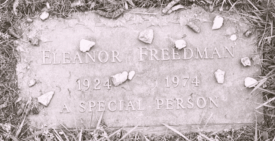
It is easy to pretend.
It’s a steamy June morning in 2020 and I am pregnant with my second daughter. My older daughter sleeps in the stroller as Matt and I walk our neighborhood loop, just outside of Boston. Passersby smile, glance at my belly, and peer into the stroller.
Right on time. Right on track. I can hear their inner monologue. A young couple with a growing family, how precious.
I smile back.
But what if they knew?
Our daughter startles into painful wakefulness. I massage her left calf trying to ease the grip of yet another spasm. Havi, our first born, is dying from Tay-Sachs, a fatal neurodegenerative disease. She turns two in September. She has months left to live. Her younger sister is due later this month. I am learning to say goodbye at the same time I am trying to say hello. I am gut-wrenched.
I can pretend with strangers. But I can’t pretend with myself. Tortured thoughts invade my mind around the clock. Both big and small questions bear the same emotional weight. The biggest one: Am I even equipped to parent a healthy child? I’m a first-time parent, and I’m focused on helping my child die gently. Smaller questions have titanic emotional repercussions: What clothes will get passed from Havi to my unborn daughter? Will I be able to bear seeing her in them, or will it somehow comfort me? How do I manage the generosity of family and friends who want to support our new pregnancy with gifts and the well wishes that were so joyfully received with Havi, but trigger me instead?
My roiling sleep is disrupted to soothe spasms, change Havi’s sleeping position, clutch her to my chest and rock in her chair, only to wonder who she will be in the morning. Developmental milestones erode; she is going backwards. What has she lost today? Can she still hold up her head? Can she still see me? Can she still hear me? Can she still swallow? Can she still smile?
As my belly grows and I try to anticipate new life, I spend most of my moments actively mothering my dying daughter. I blend smoothies that are calorically dense, since she can no longer chew and swallow solid food; I dress her as if she has a day of playgroup and music class ahead; I wrap her legs around my waist and gently place her arms over my shoulders and slow dance, because she loves music and motion, and because she deserves the privilege of being asked to dance.
Simultaneously, I hear myself questioning whether I can physically give birth. Might fear rear its ugly head, making it impossible for me to actually deliver a healthy child? Am I emotionally prepared to welcome a new baby into my life? Our lives? Can I watch one child die as another grows?
And then there is the hopefulness of it all. Of the gift of being the expectant mother of a healthy child. I can feel that too—until guilt creeps in when I feel relief that she won’t have what Havi has. But will she? There’s still the existential terror that maybe she will. There’s natural apprehension at the uncertainty of who our children will be; but the looming specter of a “Sophie’s Choice” was crushing.
Trusting her strength, I wrote to Havi in my journal. “Tomorrow we have an ultrasound for your baby sister. Please pray she will grow and thrive. We so desperately want the two of you to meet. It’s just hard to imagine it all going well. So I do need to rely on you for some strength and reassurance.” How pathetic to need my dying daughter for strength and reassurance.
Our baby-to-be does not have Tay Sachs. Yet I waited. I waited to bond. I waited to do much of anything except keep my prenatal doctor appointments. I waited until the last minute to set up her nursery, unlike the tender, detailed attention we paid to creating Havi’s room way in advance of her arrival. In fact, I didn’t even participate in this one. My siblings did it. I hated myself for that.
Now, I live in a space of motherhood reimagined, where time exists differently. It has to be about presence, and the present; and the only future I can orient toward is an eternal one. There, both of my daughters exist. It’s motherhood reimagined when milestones and play dates are replaced with long snuggles and quiet, slow mornings. On the good days. It’s motherhood reimagined when I surrender to life’s worst fate while also staying open to beautiful, big moments of even deeper love.
It’s motherhood reimagined when pretending only gets me so far. I can’t pretend that things aren’t complicated and heavy and overwhelming and sometimes debilitating. When we pretend, I am learning, we rob ourselves of deep connection: The kind of connection that requires access to the depths of soul; and there, we find a whole new constellation of emotions. Emotions that jolt us out of our fear and into spaces of bravery and boldness. Emotions that give our personhood and lives dimension; that prevent us from living as spiritual stick figures.
By learning to make space for the heaviness and the horror, and let joy, anticipation and even hope, sidle up right next to them, we make space for life. It’s when we pretend an entire set of emotions away that we cut ourselves off from the possibility of all the nourishment. And, when we have people who can be by our side as we stretch and struggle, who can bear witness to our pain without pretending it away, who soften the edges of what is possible, our maternal mental health is salvaged.
Kaia, Havi’s younger sister, will be four years old in June. She and Havi spent a little more than six months together on this earth. And her younger brother will be two years old in August. Kaia will tell you that Havi lives in her heart; Ezra points to photographs of Havi and says her name.
As I reflect honestly today, I mostly feel like I was and am an inadequate mother to all three of my children. Fear and self-doubt gnaw at me. I’m learning to expect those feelings, though, and I’m getting better at having a stern parental talking-to with them when they inevitably arrive. Maybe that’s what this whole motherhood thing is:feeling like a failure, being scared as hell, and loving big anyway.
Myra Sack is the author of Fifty-Seven Fridays: Losing Our Daughter, Finding Our Way and the Founder of E-Motion, Inc.
Perinatal mental health support is integral to a functioning society. This post is part of our collaboration with The Seleni Institute, an independent nonprofit that works to destigmatize and transform the care landscape of maternal and family mental health. Their clinicians specialize in helping individuals and couples cope with fertility challenges, third-party reproduction, miscarriage, and pregnancy after loss. Learn more about their work here. And remember, you are not alone.








